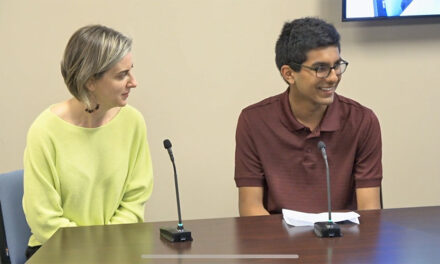By DAN TOMASELLO
LYNNFIELD — Reading over the summer will help students improve academically, three English language arts curriculum directors said during a recent School Committee meeting.
Elementary ELA/Social Studies Curriculum Director Maureen Fennessy, Lynnfield Middle School English/History Director Dr. Robin Doherty and Lynnfield High School English Department Head Maryellen Iannibelli recently gave an overview of the Summer Reading program to the School Committee.
“The purpose of Summer Reading is to keep students engaged with literacy,” said Iannibelli.
Iannibelli said the LHS English Department administered a survey to students last year in order to get feedback about the Summer Reading program.
“We had 85 percent of students participate in the survey,” said Iannibelli. “That is unheard of for high school students. We asked the students what were their favorite genres. The top three choices were young adult novels, mysteries and thrillers and dystopian works. We encouraged the staff to choose texts from all three genres. This year’s Summer Reading predominately includes works that students are interested in.”
When students return to LHS this fall, Iannibelli said students will be put into different groups that will be determined by which book they read. She said English teachers will be leading discussions about the books during the time allotted in the Compass program. She said students will also undertake a project of their choosing.
“It’s more pragmatic for students instead of having an assessment that would put them behind the eight ball when they start school in September,” said Iannibelli. “It’s flexible.”
Doherty said the middle school is requiring students in grades 5 and 6 to read a “core text” that was selected.
“Students will have packets to fill out,” said Doherty. “They will focus on characterization, plot diagrams and two column notes that connect to the literacy standards for grades 5 and 6 in the Massachusetts Frameworks. When students come back, teachers will do activities with them that will connect with the middle school’s core values (kindness, effort and citizenship). Teachers will also do project-based assessments with them.”
Doherty said seventh and eighth grade students have the choice to select a book out of 12 different options.
“When students read, they will be looking at characterization and plots,” said Doherty. “When students come back, they are going to participate in focused lessons in Advisory that are catered to the books they read.”
Fennessy said both elementary schools are “really urging our students and families to read as much as they can” this summer.
“There is a lot of research about the power of Summer Reading,” said Fennessy. “Students who don’t read over the summer or are not read to over the summer can fall behind. There is research that shows by the end of fifth grade, children who omit from reading outside of school hours can have their reading level fall behind and show signs of regression.”
Fennessy said the media specialists at both elementary schools have developed lists of recommended books for students and families to read.
“It’s a nice springboard for our families,” said Fennessy. “The books are from different genres that are appealing. I would challenge families to choose a book from each of the lists. If your family is really interested in mysteries, they can try those. There are different ways for families to challenge themselves so they can have fun.”
Fennessy also created a “Summer of Fun Calendar” that includes different activities for elementary school students to complete during Summer Reading.
“Complete as many activities as you can,” Fennessy wrote on the Summer Reading website. “Color in the box once you have completed an activity. Bring this calendar to your teacher on the first day of school.”
School Committee member Jenny Sheehan said the calendar “makes reading fun.”
“It gets the kids involved in a fun way,” said Sheehan. “I appreciate the creativity.”
Fennessy said during the School Committee’s meeting that having students read frequently over the summer will “enhance academic progress” as well as bring families together.
Iannibelli said the books included on the Summer Reading lists can be accessed from the Lynnfield Pubic Library, Boston Public Library, Hoopla and the NOBLE Network.
“Students can have an electronic version of it or can borrow a hard copy if they would like,” said Iannibelli.
School Committee Chair Kate DePrizio asked Doherty and Iannibelli if the format for students discussing Summer Reading at the secondary schools is similar to a book club.
Doherty said yes.
School Committee member Jim Dillon said the University of Cambridge’s “Psychological Medicine” journal recently undertook a study with Shanghai, China-based Fudan University that revealed students who started reading “recreationally at an early age had better verbal learning, memory, speech development and academic achievement than their peers who weren’t picking up books for fun.”
“Kids who read for pleasure had better mental well-being, showed fewer signs of depression or stress and fewer behavioral problems,” said Dillon while reading an article on the CNBC website about the study. “They spent less time looking at screens such as TVs and phones, and were able to sleep longer.”
Dillon also said “reading has a lot of impacts on child development in so many ways.”
School Committee Vice Chair Kristen Grieco Elworthy thanked Fennessy, Doherty, Iannibelli and media specialists for developing the Summer Reading book lists for students and families.
“As a parent, it is huge that we get these lists,” said Elworthy.
Doherty concurred with Elworthy’s point of view.
“We just want students reading and thinking,” said Doherty.
School Committee member Jamie Hayman said the Lynnfield Public Library’s Summer Reading program is “really well done.”
“Kids thrive off of competition, and it’s a good way to do it,” said Hayman.
Hayman recalled that administrators and curriculum directors present the district’s MCAS results to the School Committee each November.
“The single most important thing our kids can be doing to impact MCAS scores is reading,” said Hayman. “There is no better thing that can have a broader impact on the student and the overall district. It all ties together.”
Fennessy agreed.
“Reading is the number one factor to equal academic success,” said Fennessy. “I talked with families at Kindergarten Screening about what they can do to set their young learners up for success. I said there is nothing better than to read aloud and enjoy texts with your child. We know that time is tight and things are busy, but we also know skipping out on reading beyond the school day can lead to kids falling behind.”
For more information about the School Department’s Summer Reading program, visit https://sites.google.com/lynnfield.k12.ma.us/lps-summer-assignments/home.



